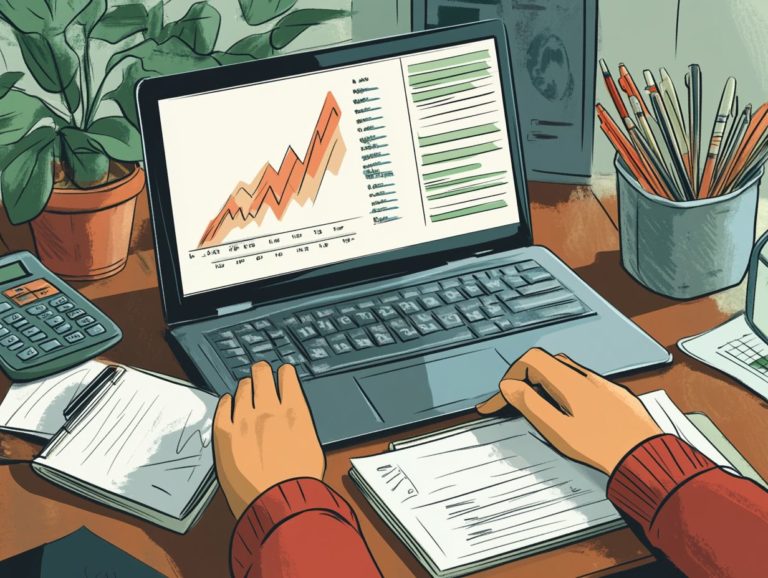5 Tips for Managing Your Credit Responsibly
Managing your credit wisely is essential for your financial health. It unlocks opportunities like securing a loan, renting an apartment, or landing a favorable interest rate.
This article explores five key tips to help you understand and improve your credit score. By making timely payments and regularly checking your credit report, you can take control of your financial future.
It also highlights the importance of responsible credit management and the many benefits it brings. Keep reading to discover how to strengthen your credit habits!
Contents
Key Takeaways:

- Monitor your credit score often to understand where you stand.
- Always pay your bills on time to keep your credit score healthy.
- Limit your credit usage to maintain a low credit utilization ratio.
1. Understand Your Credit Score
Understanding your credit score is essential. It shows how creditworthy you are and affects your chances of getting loans or credit cards with better terms.
The Consumer Financial Protection Bureau (CFPB) states that a solid credit score can enhance your financial responsibility and open doors in your financial journey.
Your credit score is based on several key factors, with payment history being the most significant. Consistently making timely payments shows reliability, while poor payment history can lower your score.
Another important factor is your credit utilization ratio. This compares how much credit you re using to your total available credit. Ideally, keep this ratio below 30% for a healthy score.
Having a mix of credit types like revolving credit cards and installment loans can positively impact your score. By understanding these elements, you can build a stronger credit profile and improve your financial health.
2. Pay Your Bills on Time
Paying your bills on time is crucial for maintaining a healthy credit score. It directly impacts your payment history and helps you avoid credit card debt.
Consistently meeting your payment deadlines shows lenders that you re a reliable borrower. This reliability matters because credit card issuers report your payment behavior to credit bureaus, shaping your credit profile.
To help you pay on time, consider using automated payments. Setting up automatic transactions ensures your bills are paid without fail.
Utilizing reminders through mobile apps or calendar alerts can further assist you in managing due dates, providing a safety net against oversight.
3. Keep Your Credit Utilization Low
Maintaining a low credit utilization ratio is essential for optimizing your credit score. This ratio reflects how much of your available credit limit you’re using.
Credit utilization is calculated by dividing your total credit card balances by your total credit limits. For example, with a total credit limit of $10,000 and a balance of $2,500, your credit utilization would be 25%.
To keep this ratio in check, consider these strategies:
- Use lower balances on your credit cards to minimize the percentage.
- Request an increase in your credit limits to increase available credit without raising your spending.
- Utilize balance transfers to shift existing debt to cards with lower interest rates, helping manage your credit card debt effectively.
4. Monitor Your Credit Report Regularly

Regularly monitoring your credit report is essential for maintaining your financial health. It enables you to track your credit history, spot any suspicious activity, and ensure the accuracy of your credit information.
Check your credit reports at least once a year for best results. However, doing so quarterly can offer you even deeper insights.
Utilizing various tools, such as credit monitoring services like IdentityForce, can make this task more manageable. These services alert you to any changes or red flags in real time.
By catching errors or signs of fraud early, you can address issues proactively. This ultimately safeguards your financial future and fosters responsible credit behavior.
5. Avoid Opening Too Many Credit Accounts
Avoiding the temptation to open too many credit accounts in a short span is crucial for preserving your healthy credit score and maintaining a positive credit history with your card issuers.
Every time you apply for credit, a serious credit check gets recorded, which can momentarily dent your score. Be mindful of how these inquiries can add up quickly!
It’s essential to plan your credit applications with care. Equally important is understanding the transaction fees tied to your credit cards; these hidden costs can accumulate and potentially impact your overall financial health.
When contemplating a credit limit increase, approach it responsibly by evaluating your spending habits. This ensures you can manage your credit effectively and learn how to use a credit card responsibly, steering clear of the pitfalls of debt.
Why Is It Important to Manage Your Credit Responsibly?
Managing your credit responsibly is essential for reaching your financial aspirations. Following 5 tips for using a credit card responsibly influences your credit score and determines your access to loans, credit cards, and favorable interest rates.
By building a solid credit history, you can unlock opportunities for securing larger loans for significant purchases, like homes or vehicles, often accompanied by more attractive terms.
For example, with a good credit score, you could qualify for a mortgage with a considerably lower interest rate, potentially saving you thousands over the years.
Neglecting your credit management can lead to higher interest rates and increased challenges in obtaining funding. Poor credit behavior can restrict your access to premium financial products, hindering your ability to achieve crucial milestones, whether that s launching a business or setting aside funds for retirement.
Responsible credit management can unlock exciting opportunities for financial stability and the realization of your dreams, including how to manage multiple credit cards wisely.
What Factors Affect Your Credit Score?
- Payment history
- How much of your available credit you are using
- The length of your credit history
These factors play a crucial role in determining your overall creditworthiness. For instance, making timely payments is a major player, often representing the largest slice of your score pie.
Your credit utilization ratio also wields considerable influence, underscoring the necessity of managing your debts effectively.
The length of your credit history provides insight into your borrowing and repayment experience, impacting how trustworthy lenders find you. By understanding these factors, you can strategically enhance your credit score, enabling yourself to make informed financial choices.
How Can You Improve Your Credit Score?

Improving your credit score demands a commitment to financial responsibility. This involves consistently making payments on time and maintaining a low credit utilization ratio. Both actions significantly enhance your creditworthiness.
To effectively boost your score, consider creating a detailed budget. This will help you track your expenses and prioritize debt repayments. Implementing automated payments for your bills not only minimizes the risk of late fees but also establishes a reliable payment history, which is essential for a solid credit rating.
Regularly reviewing your credit reports is another crucial step; it allows you to identify any errors or discrepancies that could be negatively impacting your score. Additionally, following tips for a comprehensive credit card application can help you manage your debt by consolidating high-interest loans, showcasing proactive financial management and ultimately leading to a stronger credit profile.
What Are the Consequences of Poor Credit Management?
Ignoring your credit management can lead to crippling debt and high interest rates that could jeopardize your financial freedom. Poor credit management can lead to increasing credit card debt, soaring interest charges, and significant damage to your credit score, ultimately constraining your financial possibilities.
When you lose track of your spending and miss payments, you often face high-interest charges that can spiral out of control. For example, a single late payment might trigger a spike in your interest rate, meaning your outstanding balance grows each month.
This growth makes it increasingly challenging to tackle the principal amount. Transaction fees for cash advances or foreign purchases can also pile up quickly, further straining your finances. By taking early action and cultivating healthy financial habits, you can mitigate these issues and pave the way for a more stable financial future.
How Can You Build Good Credit Habits?
Building good credit habits is about managing your credit utilization wisely and using budgeting tools to keep track of your financial behavior. To make this process smoother, consider following tips for managing credit card payments and setting up reminders for upcoming due dates.
This simple step can help you avoid the pitfalls of late payments that can damage your credit score. Automating your payments can also take the stress out of remembering deadlines, ensuring that you meet your obligations without a hitch.
Plus, regularly evaluating your cash flow with user-friendly budgeting tools can reveal valuable insights into your spending habits. Embracing these practices not only fosters discipline but also cultivates a positive relationship with credit, paving the way for a healthier financial future.
What Are the Benefits of Having a Good Credit Score?
A good credit score can unlock a world of financial benefits that can change your life! The benefits of maintaining a good credit score include the opportunity for credit limit increases, access to rewards credit cards, and lower interest rates on loans, all of which open the door to enhanced financial opportunities.
For instance, when you have a solid credit rating, securing lower mortgage rates becomes a reality, potentially saving you tens of thousands of dollars over the life of the loan.
Consider a couple who, after years of careful credit management, finally purchased their dream home. Not only did they qualify for a favorable interest rate, but they also avoided private mortgage insurance, which further lowered their monthly payments.
These advantages can profoundly impact your budgeting and spending habits, enabling you to invest more in your future and enjoy a higher quality of life.
Frequently Asked Questions

What are the 5 tips for managing your credit responsibly?
- Pay your bills on time
- Keep your credit card balances low
- Monitor your credit report regularly
- Limit your credit applications
- Use credit cards wisely and avoid unnecessary debt.
Why is it important to manage credit responsibly?
Managing credit responsibly is crucial, as it affects your credit score and influences your ability to get loans, credit cards, and even rent an apartment. For tips on this topic, check out how to use your credit card responsibly after approval.
By managing credit well, you can maintain a good credit score. This increases your chances of being approved for credit in the future, especially when you apply the 5 ways to enhance your credit card experience.
How can I pay my bills on time?
Set up automatic payments with your bank or credit card company. You can also set reminders or create a budget to ensure you have enough funds to cover your bills each month.
What does it mean to keep your credit card balances low?
Keeping your credit card balances low means using a small percentage of your total credit limit. Aim for a credit utilization rate below 30% to show lenders you manage your credit responsibly.
How often should I monitor my credit report?
Check your credit report at least once a year! This helps you spot any errors or possible fraud early on.
You can request a free credit report from Equifax, Experian, and TransUnion once every 12 months.
Is it bad to have multiple credit cards?
Having multiple credit cards isn t necessarily bad. As long as you manage them responsibly, it can work in your favor.
However, too many cards can increase your credit utilization rate and harm your score. Only open credit cards you truly need.






